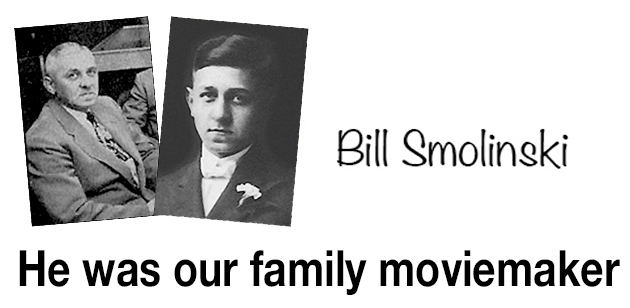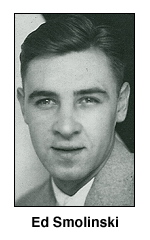| HOME |
 |
 |
William Smolinski the second child of Boleslaw and Helena Smolinski. He was born in Kolno, Poland in 1906 after his parents returned home from the United States where they had lived for awhile in New Jersey and had their first child, Wanda, in 1904. On his birth certificate, Bill is listed as Boleslaw Smolnik. When his parents returned to the United States, this time settling in Solvay, New York, either later in 1906 or a year later, he became known as William Smolinski, though he was usually called Bill. His father left the family when Bill was about six or seven years old. In addition to Wanda, Bill's siblings included sister Helen (my mother) and brother Edward. His mother, whom we always called Nana, was a cook at the Solvay Process Company, and she depended on her children to do a lot of the work around the house. This may have accounted to the sense of responsibility that was especially strong with Bill. He married Gertrude Maltby and they had four sons – William (better known as Bimby), Robert (Bobby), James (Baby Jimmy) and Philip Duncan Smolinski. I mention Phil's middle name because I believe that was done at his father's insistence. I forget why. My first recollection of Bill Smolinski: He was the uncle who made movies with his 8 mm camera. Bill Smolinski seemed to enter the 20th century before other members of my family. He was the first to have a movie camera, probably would have been first to have a camcorder, computer and iPod years later. In any event, it was always exciting to be invited next door for a screening of a new movie or two that Uncle Bill had taken of some family or Solvay activity. One of the big annual events in the village was the June Festival, which was like a football halftime show, though it went on for a couple of hours and featured students from the four Solvay schools. The parade route of students from Prospect Elementary School took them up our street, Russet Lane, which ended at Woods Road Park where the festival was held. The festival was on Bill's "must film" list. BILL SMOLINSKI a great sense of humor, but a gruff voice that scared me a bit when I was a kid. However, he was always kind, often playful and was instrumental in providing the sources of a lot of the fun we had on Russet Lane. Most memorable: 1. The playground set he built, perhaps in partnership with my father, who for many years was a welder at the Solvay Process Company. This was a heavy metal apparatus that must have been well placed in concrete because it was so sturdy that it wasn't supported on either side; it was just three vertical poles held together by a horizontal pole at the top. Hanging from that pole was chain metal that supported a swing on one side, a monkey bar on the other. This playgym was located at the back of the Smolinski property, in a tiny clearing between some bushes and a line of poplar trees that separated Russet Lane backyards from a hill that at the time was owned by (and overlooked) the Solvay Process. Countless kids did their first pull-up on that monkey bar or learned how to skin-the-cat or hang by their legs. I imagine it's gone now, but I was hoping it would remain in place until a generation in the 23rd century discovered it and tried to figure out what it was. 2. Bill Smolinski was the first parent on our street to put a basketball hoop and backboard on his garage. This project I know for sure was done with my father, who made the hoop, which, as Dr. Seuss said about the Grinch's brain, was about two sizes too small. (For more on that, see At the Center of the Universe.) When I look back, I'm reminded of "Field of Dreams," a movie that came along many years after the hoop went up at 106 Russet Lane. The best-known line from that movie is "If you build it, he will come," though most of us misquote it as "they will come." Well, Smolinski's basketball court was as good an example as Kevin Costner's baseball field. Kids from all over Solvay flocked to Russet Lane to play basketball. Sometimes you had to wait a couple of games before you could play. Eventually there would be four driveway courts – including ours – on the one-block street, but none was as popular as the court Bill Smolinski built. 3. The jit. As mentioned elsewhere (See the Russet Lane Top Ten), the jit exists in Smolinski memory the way Rosebud did for Charles Foster Kane. I'm assuming it was Bill Smolinski who purchased this unusual vehicle, which was used by at least three generations of children. It was special because lots of kids had tricycles, bicycles, scooters and sleds, but only one family had the jit. Where is came from remains a mystery. I've Googled until my fingers were sore, but have never found anything online that resembles this toy from my childhood. Uncle Bill is remembered for several other things. He used to throw a big party or two every summer. For kids or adults like my father, who didn't like beer or mixed drinks, the beverages usually were a collection of products from what may have been a local distributor for a company that must have specialized in ginger ale. That's how I happened to sample such things as birch beer and cream soda, which I associate with a Bill Smolinski party, though I pretty much stuck to orange soda, which was part of the mix. However, for Bimby's high school graduation party, probably in 1950, Uncle Bill tapped a different source – Pepsi-Cola. And that changed my life, much to my mother's regret. Also acquiring the Pepsi habit was my sister, who these many years later is still addicted (as I most certainly would be if I hadn't married a woman whose father was a vice president at Coca-Cola). Anyway, my mother's best efforts were for naught; Pepsi replaced milk at our dinner table. And it all started at my Uncle Bill's house. Bill was a hunter, usually for ducks and pheasants. He had a shotgun and a .22 rifle, which means he probably did some deer hunting as well. Playing a large role in the lives of everyone on Russet Lane in the 1940s and '50s was that hill on the south side of our street. There was nothing on that hill, which was used for victory gardens during World War II and several years thereafter. (There were probably enough tomatoes grown by Russet Lane residents to feed all of Onondaga County, though several of those tomatoes were ammunition in the annual tomato wars.) The hill was used for many other things. Among them, target practice. It was where I fired a rifle for the first time, during a short lesson from Uncle Bill, whose primary pupil that day probably was my cousin, Bob. I only fired once, maybe twice, and was quite content not to do it again until I was handed an M-1 as part of my Army basic training in 1961. I don't think I've ever eaten venison, but thanks to Uncle Bill I did have pheasant one evening, and might have enjoyed it were it not for the buckshot I found in my piece. BILL WORKED for Semet-Solvay, a division of the Solvay Process Company, which eventually was taken over by Allied Chemical. A Solvay Process publication in 1952 referred to Bill as the assistant superintendent. Four years earlier the company had sent him to Lorain, Ohio, to assist with a project there. I remember it was 1948 because that was the season the Cleveland Indians won the World Series. No one in the family was an Indians fan before that season, but with Uncle Bill working in a Cleveland suburb, my cousins and I got caught up in the American League pennant race, which ended in a tie, with Cleveland beating the Boston Red Sox in a one-game playoff. I think both cousins Bobby and Bimby visited their father in Lorain that summer. Bimby, I know, went with Uncle Bill to see an Indians game. WHEN BILL got together with his younger brother, Eddie, you could expect a couple of things – there'd be some drinking and some squabbling. The more they drank, the more they squabbled. Both were handy guys, though they approached projects differently. Bill struck me as the type who'd read instructions before he attempted anything; Eddie was more inclined to act on instinct, pioneering his own method, as he did while mixing concrete for the house he built. He added paint to the concrete so that his sidewalk had kind of a flagstone look to it, though in a neat pattern that cut each square into four equal triangles, each a different color.
What my father missed was a Smolinski classic. Bill and Eddie drank a little, but bickered a lot. It was what you might expect if Abbott and Costello had done a home repair TV show. My mother, my sister and I finally got out of the house, half afraid there'd be an explosion. But Bill and Eddie finally finished the project, and they must have done a good job because the dryer worked perfectly – and would continue to do so for many years. THE MAJORS – with my father as Exhibit Number One – were fussy eaters. At restaurants we might be hard-pressed to find anything we liked. The Smolinskis – with my Uncle Bill as Numero Uno – were adventurous eaters. They'd enthusiastically accept anything put on their plates, then ask for seconds, maybe thirds. That's a big reason why for all these years since his death – in 1975, from a form of leukemia – Uncle Bill is often on my mind. As my taste in food has expanded and my willingness to try new things has grown, I find myself regretting that I never had a chance to share meals with the family member who'd probably enjoy them the most. Likewise, I think of Bill Smolinski when I'm outside doing nothing more than appreciating the plants and birds around me. Bill's curiosity was such that he probably never experienced boredom. I'll admit, as a youngster I didn't know quite what to make of my Uncle Bill because his interests and mine (which at the time were mostly about sports) seemed so different. As an adult, I regret that I didn't get to know him better (though I'm still not interested in shootings ducks or pheasants). But for all of that, the food, the wine and the joy of the outdoors, there'll be something else on my mind should I run into Uncle Bill in the Great Beyond. So what's the story with the jit? |
| HOME | CONTACT |
 Things were never funnier, or more nerve-racking, than the day Bill and Eddie, in rare comic form, decided they would install my mother's gas dryer. My father, who wanted no part of this project, was away from the house that day, perhaps on village business, perhaps hiding.
Things were never funnier, or more nerve-racking, than the day Bill and Eddie, in rare comic form, decided they would install my mother's gas dryer. My father, who wanted no part of this project, was away from the house that day, perhaps on village business, perhaps hiding.